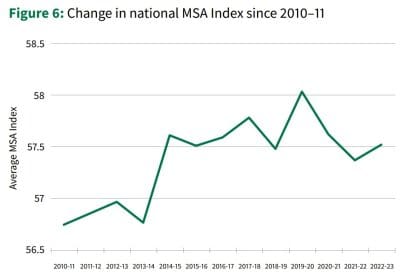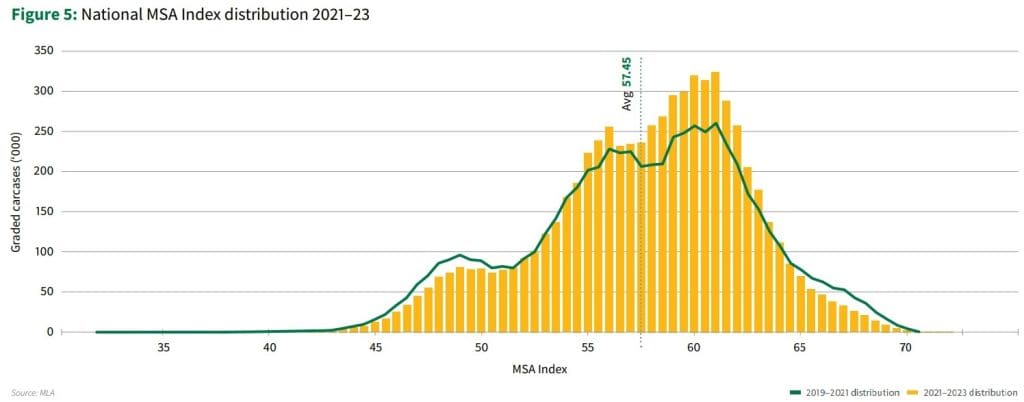Performance recorded under the Meat Standards Australia eating quality index improved last financial year, as the impact of the 2019-20 drought on the national cattle herd continues to recede.
As this graph shows, annual EQ index performance reached a peak in 2019-20, above 58, before falling for two consecutive years due to nutrition and drought impact on growth rate, and other factors.

Last year, 2022-23, the figure recovered to just above 57.5, lifting from 57.4 the year before.
Over the two year period 2021–23, the average MSA Index was 57.45, a small decrease from the 2019–21 average of 57.69.
Longer-term, the average MSA Index of slaughter cattle from Australia’s national herd has improved by almost one index point since 2010–11. The improvement is reflective of changes in on-farm management and genetic decisions.
The EQ index trends were captured in MSA’s latest two-yearly Australian Beef Eating Quality Insights Report, released today.
The 2023 report reflects the ongoing improvements MSA registered producers are making to raise the eating quality of their cattle and ultimately, meet consumer expectations. It puts comprehensive feedback data into a single document that analyses trends and outcomes from the MSA program, breaking down data by state and a range of other factors.
MSA graded cattle continue to represent more than half of the national adult cattle slaughter, comprising 54pc for the 2022–23 financial year.

The latest report was generated through the analysis of all MSA graded cattle in the 2021–22 and 2022–23 financial years using data collected by MSA-accredited graders, along with additional data from sources such as the National Livestock Reporting Service and further information such as animal disease and defects.
The 2023 Australian Beef Eating Quality Insights report was generated from the analysis of MSA grading results of 6.33 million cattle processed and graded through 39 MSA licenced processors during the 2021–22 and 2022–23 financial years.
$463m lift in farmgate returns
The 2023 Australian Beef Eating Quality Insights report suggests that the MSA program has generated $463 million in farmgate returns for producers over the past two years.
MSA program manager Dr David Packer said the report showed the trend of continual improvement within the industry, setting out all the data to help continue to build on these achievements.
“The premiums for MSA compliant cattle, combined with the growing numbers of cattle being MSA graded with higher carcase weights, have generated farm gate returns of $463 million since 2021,” he said.
Processors and brand owners will often offer financial incentives for meeting minimum MSA compliance and eating quality specifications, resulting in the significant farmgate returns enjoyed by MSA beef producers in the previous two years.
“In 2021–2023, non-grainfed cattle that met MSA and company requirements potentially received on average an additional 36c/kg over-the-hooks compared with non-MSA cattle,” Mr Packer said.
The average non-grainfed cattle consigned for MSA grading during this time weighed 306kg, which potentially equated to an additional $110 per head.
“Likewise, the premium for grainfed cattle that met MSA and company requirements was an additional 15c/kg compared with non-MSA grainfed cattle,” Mr Packer said.
In addition, grainfed cattle consigned to MSA weighed 347kg which potentially led to an additional $51/head, he said.
- The report also clearly illustrated the effect that disease and parasite challenge has on eating quality performance. More on this in a separate article to come.
